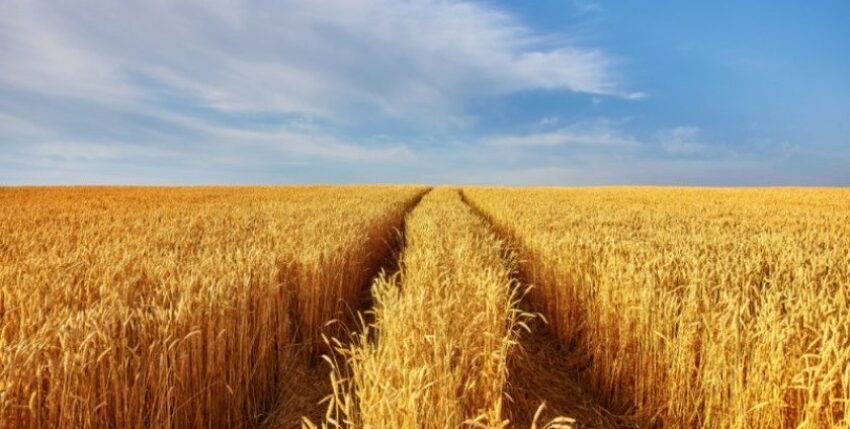Russia calls for sanctions to be waived
Wheat prices rose to a record high in March, and the increase in food prices has triggered protests in many developing countries and contributed to an acceleration in global inflation rates.
The United Nations is trying to negotiate an agreement so that Ukrainian grain can be shipped from Black Sea ports such as Odessa. Russia has stated that it wants the sanctions to be lifted as part of the agreement.
Without access to the sea, Ukraine is focusing on alternative routes to reach its target of 2 million tonnes per month. It hopes to be able to send 700,000 to 750,000 tonnes per month from two small ports on the Danube to Romania. The rest is to be transported to Europe by road and rail.
But progress is slow at the moment. In the first 22 days of May, only 28,000 tonnes were exported by road. Rail transport is a more promising option, but remains complicated and costly. Ukrainian trains have to stop at the border because the gauge of the Soviet-era railway is 9 cm wider than that of neighbouring European countries. The grain is then reloaded onto other trains or the wagons are lifted onto narrower underframes, all of which takes time and limits the export volume.
Once the grain has passed the controls, the next obstacle is the lack of storage capacity in European ports, where tens of thousands of tonnes of grain have to be stored in elevators before they can later be loaded onto cargo ships.
Russia is prepared to set up a humanitarian corridor for ships carrying food to leave Ukraine in return for the lifting of some sanctions, the Interfax news agency quoted Russian Deputy Foreign Minister Andrey Rudenko as saying on 25 May.
Growing support for naval escorts for Ukrainian grain
There is growing support in Europe for sending warships to the Black Sea to escort freighters carrying Ukrainian grain as the world worries about shortages and rising prices. The priority is to ensure that the grain reaches Africa and other developing countries, according to an interview on the sidelines of the World Economic Forum in Davos.
Russia has effectively blockaded Ukrainian harbours as part of its invasion. The head of the United Nations World Food Programme, David Beasley, described the blockade as a "declaration of war" that threatens to trigger mass migration and a global food crisis.

Britain is in talks with allies about sending warships to the Black Sea, The Times newspaper reported. A government spokesman said Britain would continue to work with other countries to find ways to resume grain exports from Ukraine, but added that there were "no current plans to send British warships to the Black Sea".
The Montreux Convention of 1936 allows Turkey to regulate maritime traffic through the Bosporus strait to the Black Sea in both peacetime and wartime. By blockading Ukraine's harbours, Russia has forced Ukraine to transport grain by land, resulting in only about a fifth of the amount that could normally be exported. But the Russian campaign on the ground has stalled and it has failed to capture key ports such as Odessa, while losing the flagship of its Black Sea fleet. Odessa is Ukraine's most important deep-sea harbour, which used to handle almost all grain exports. It has already been attacked several times by Russian missiles, and Kiev fears that Moscow wants to capture it like other Ukrainian harbours, possibly through an amphibious assault.
Russia steals wheat
Ukrainian President Volodymyr Zelensky has claimed that Russia is stealing grain in the occupied territories. Russia and Ukraine are important suppliers of wheat and sunflower oil in the world. Ukraine is also one of the six largest exporters of corn, chicken and honey. The country traditionally ships millions of tonnes of grain per year across the Black Sea and generates about 10 % of its gross domestic product in the agri-food sector.
Stavridi's proposal
Admiral James Stavridis makes a different suggestion based on his own experiences in the Arabian Gulf in the late 1980s. In the midst of the so-called tanker war with Iraq, the Iranians attempted to close the vital Strait of Hormuz. The rest of the world needed to keep the oil flowing and opted for a rather dramatic solution: escorting convoys of American-flagged oil tankers in and out of the narrow waterway. Operation Earnest Will, which ran from the hot summer of 1987 to the autumn of 1988, was largely successful.
As the world faces food shortages due to Russia's illegal blockade of Ukraine, should a similar mission be considered? But the first question is, who should do the escorting? This could be done under the auspices of the United Nations or a coalition of nations willing to take on this provocative and dangerous mission. A second challenge will be mine sweeping, as both the Ukrainians and the Russians have deployed them to control the seas along the Ukrainian coast. NATO has a permanent fleet of minesweepers for exactly this purpose.
Belarusian route for Ukrainian grain?
For the EU, this would be both a hope and a headache. One of the ways out of the looming world food crisis is to redirect the millions of tonnes of grain stuck in Ukraine via Belarus. However, the difficulty here is of a political nature: the EU would have to lift the sanctions it recently imposed on Belarus. When the EU heads of state and government met for the second day of their special summit on 31 May, they were to discuss the looming food crisis and ways of circumventing the Russian blockade on Ukrainian exports. EU leaders will consider all options to circumvent Russia's blockade of Ukrainian ports for food exports, including a naval mission to escort cargo ships. Ukrainian farmers now have an estimated 22 million tonnes of grain in storage. According to sources, diplomats have discussed the Belarus route, in which grain from Ukraine is transported via the Baltic Sea rather than the Black Sea. The advantage of such a solution is that Belarus has the same width of railway tracks as Ukraine, which date back to Soviet times.
Although Belarus is a landlocked country, it used to export large quantities of potash by rail to the Lithuanian port of Klaipėda. Lithuania is also a former Soviet republic that inherited the Soviet-style railway tracks.
Sources: Salvatore Mercogliano, Alexander Gillespie, Pavel Polityuk, Felix Hoske, Stefaniia Bern, Natalia Drozdiak, Rosalind Mathieson, Kitty Donaldson, Gotev, Thomson Reuters 2022, Bloomberg, Euractiv










